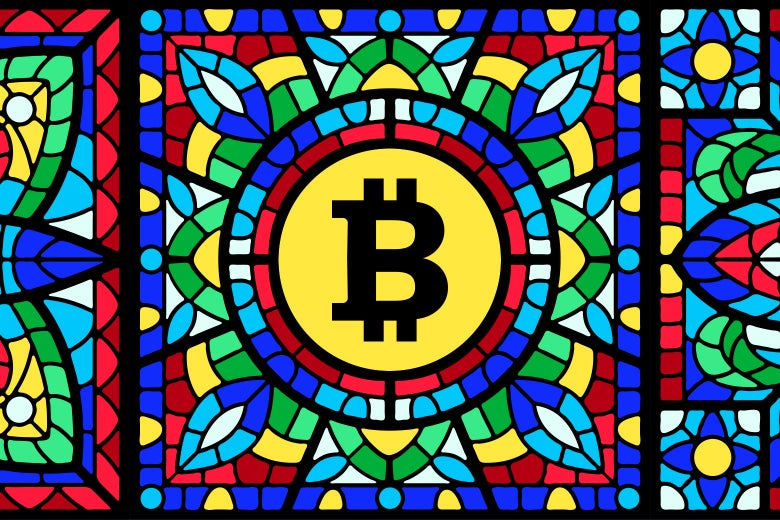Tomer Strolight had never believed in God, but in 2013, he discovered Bitcoin.
He was immediately fascinated. “The more I studied it, the more I realized that this is an incorruptible system,” he says, “that this is a system that has justice built into it through math and truth.” And the more Strolight—who is 52 years old, lives in Toronto, and now works as a Bitcoin educator—learned about Bitcoin, the more he became convinced that the world’s first cryptocurrency was not solely the work of man. “This is the genius of God,” he says.
That’s why, on a recent spring day in Miami, Strolight decided to get baptized. As the sun set, he waded into the warm waters off of South Beach. Patrick Melder, a former ear, nose, and throat surgeon and evangelical Christian from Atlanta, followed him into the ocean. Facing the beach and a crowd of onlookers, Melder, 54, placed one hand behind Strolight’s back, another on his chest, and lowered him into the water. Strolight was nervous. He later told me that he wondered to himself, “Has doubt entered your mind?”
As Strolight interrogated his beliefs one last time, Melder plunged him into the brine of the sea. “I now baptize you in the name of the Father, Son, and Holy Spirit,” he intoned with a subtle southern twang. He lifted Strolight out of the ocean, they embraced, and onlookers on the beach cheered. Strolight’s faith in Christ was resolute. Through Bitcoin, he had found God.
Earlier that day, Strolight was part of a panel of converts who had found Christ through crypto. That panel was part of the first annual conference for Christian Bitcoiners, Thank God for Bitcoin, whose attendees included a prolific writer on Bitcoin with more than 300,000 followers on Twitter, the founder of the now famous Bitcoin Beach, and Tim Tebow, a devout evangelical and former professional football player. Authors of the book Thank God for Bitcoin organized the conference.
As the price of Bitcoin has crashed more than $40,000 in the past year, at times down more than 70 percent from its peak value, some have prophesied the death of crypto. Perhaps there is no better rebuttal to these predictions of cryptocalypse than this sect of Christian Bitcoiners, whose crypto-conviction echoes a more familiar, unshakeable religious faith.
“Bitcoin adoption becomes a conviction,” writes Melder, who baptized Strolight, in his self-published book, The Christian Case for Bitcoin. “A conviction based in truth and fact. And like our faith, conviction will steady us in times of volatility or doubt.”
For Joseph Laycock, a professor of religious studies at Texas State University who recently wrote about Bitcoin and religion, the emergence of a Christian Bitcoin community isn’t surprising. “In America, we have Christian versions of everything,” he says in an interview, adding later, “We have Christian golf balls in addition to normal golf balls. We have Christian rap albums in addition to normal rap albums.”
However, Laycock suggests that the union of Bitcoin and Christianity isn’t merely coincidental. He sees parallels between Bitcoin belief and a “paranoid streak of American evangelicalism,” which views the world as a battle between good and evil. Bitcoin devotees likewise believe that the cryptocurrency is “good money,” a righteous overhaul of a corrupt, international monetary system.
And Laycock also recognizes a resonance between Bitcoin and the “prosperity gospel,” a Christian movement that began after World War II whose preachers argue that Jesus wants his flock to be rich. Similarly, Bitcoin evangelists like Patrick Melder argue that Bitcoin will make adopters well off and help them beat inflation. “In the not-too-distant future,” he writes, “those who adopted Bitcoin early, will be immensely wealthy.”
Melder, a self-described evangelical with a “fundamentalist bent,” first learned about Bitcoin in 2018. He then fell down the “proverbial rabbit hole,” a common expression Bitcoiners use to describe their conversion from “normies” to cryptocurrency devotees.
Melder began believing so strongly in the power of Bitcoin that he decided to spread the crypto-gospel abroad. For years, he and his family had traveled to Panajachel, Guatemala, a lakefront town popular with tourists, to run an art camp for students at a small Christian school. Once he became a devout Bitcoiner, he mulled over how the cryptocurrency could help the school and surrounding community.
Around that time, Bitcoin Beach, an initiative in El Salvador led by another American evangelical Christian, achieved worldwide fame. Funded by an anonymous donor, the project aimed to create a “circular Bitcoin economy”—or market where buyers and sellers solely buy and sell in Bitcoin—in the small beachfront town of El Zonte. Bitcoin Beach attracted attention, and in 2021, when the president of El Salvador announced that the country would become the first in the world to adopt Bitcoin as legal tender, he cited the small town as an inspiration.
The apparent success of Bitcoin Beach validated Melder’s belief in the cryptocurrency’s power to help the poor. Beginning in the fall of 2021, he has traveled multiple times to Panajachel to establish a circular Bitcoin economy. In a project he has dubbed Bitcoin Lake, he teaches classes on Bitcoin to children, convinces local business owners to accept Bitcoin as payment, and prompts the municipality to use renewable energy to mine the cryptocurrency. “Bitcoin provides a solution where you give the person the ability to be free to make their own decisions, not to be held in bondage by corruption,” he says.

Melder also believes Bitcoin has “all the trappings of religion,” something a number of other commentators have argued. There is a prophet, Satoshi Nakamoto, the still-anonymous founder of Bitcoin. There is a sacred text, Nakamoto’s white paper, the first published blueprint for the cryptocurrency. And there is a well-established holiday, Bitcoin Pizza Day, which celebrates the first time someone used Bitcoin to buy something (in this case, two large pizzas).
There is even a self-proclaimed “Church of Bitcoin,” a small online community established by Henry Romp, a 30-year-old software developer who lives in Middlebury, Vermont. Romp infrequently holds “audio services” on Twitter during which he reads from Nakamoto’s famed 2008 white paper. His home in Vermont, which has the Church of Bitcoin’s logo on the front door, also has a library of books on Bitcoin that he gives to the crypto-curious. “When Satoshi Nakamoto created Bitcoin, I think that he was divinely inspired,” he says, “that a benevolent God of some sort either sent him or sent him the idea.”
Like Strolight and Melder, Romp is a Christian. (However, he is quick to clarify that the Church of Bitcoin is not Christian and is expansive enough in its interpretation of Bitcoin’s divinity to include those from other religions.) He even went to the Thank God for Bitcoin conference in Miami earlier this year. And like his faith in God, his faith in Bitcoin is unwavering. “I am not shaken by the current fall,” he states, pointing out that the cryptocurrency’s price has crashed many times before.
In fact, Romp can’t foresee a future where Bitcoin will be dead or effectively worthless. “Myself and literally thousands and thousands of others believe in Bitcoin and will always be willing to pay for Bitcoin,” he says. “It can’t go to zero as long as I’m alive, because I will pay more than zero for it.”
Romp, Melder, and Strolight’s unshakeable belief amid crypto’s recent collapse is familiar to religious studies scholars. Multiple professors of religion point to the well-known book When Prophecy Fails, which details how the faithful double down on their beliefs when, for example, Christ does not come on a predicted date. “Some people will lose faith and move on and get over their lives,” says Catherine Wessinger, a professor of the history of religions at Loyola University New Orleans who specializes in new religious movements. “But other people will continue to believe in the prophecy, and they’ll reinterpret it, and they’ll just reinforce their faith.”
And perhaps part of reinforcing one’s faith includes developing new rituals to proclaim one’s belief. When asked what he would say if he were baptizing someone as a newly devout Bitcoiner, maybe in the warm waters of South Beach, Melder ad-libbed. “Do you believe Bitcoin is the only coin, the true coin?” he said, laughing. “I now raise you in the new life of Bitcoin.”
Future Tense is a partnership of Slate, New America, and Arizona State University that examines emerging technologies, public policy, and society.
